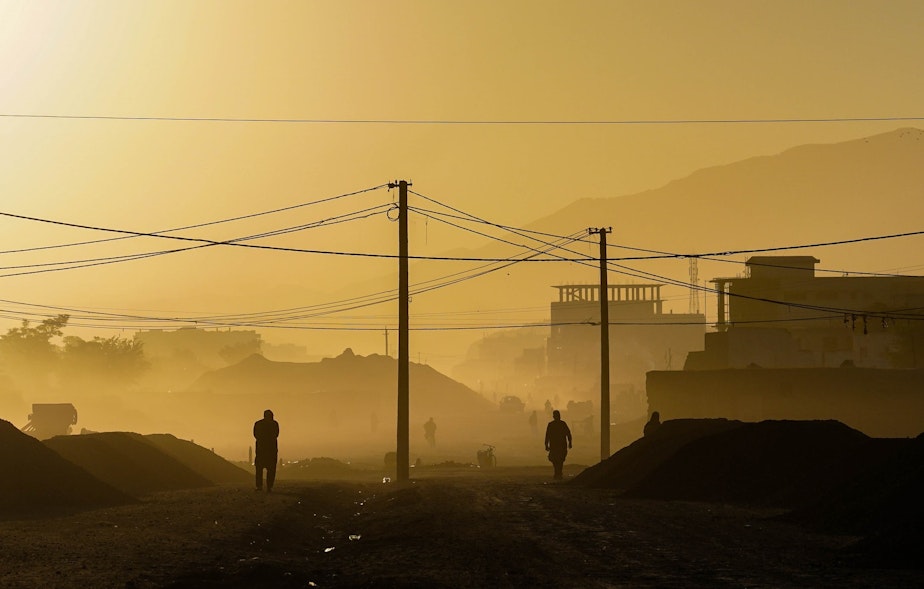A Seattle-area Afghan American reacts to ‘stolen hope’

As the longest war in United States history comes to a close, fears that the pullout would lead to catastrophe have been realized. The chaotic U.S. withdrawal from Afghanistan has tragic repercussions for Afghans and Afghan Americans.
Seattle has a small but vibrant Afghan American community. KUOW's Paige Browning spoke to Bahana Naimzadeh, whose parents came to the U.S. in 1979 when the Soviets invaded Afghanistan.
This interview has been edited for clarity.
Paige Browning: First, I really cannot imagine what watching this unfold would be like for you and your family and other Afghan Americans. How are you coping?
Bahana Naimzadeh: It's been really devastating. It's just this constant loop of just feeling hopeless and then angry, and then just trying to breathe, and then just all over again. We just keep getting more and more news that comes out of there. It's hard not to feel angry, and it's hard not to feel sad. I'm just not sure what's next.
Did you at all expect an outcome like this? Or did you see it going another way?
I did not imagine this to happen this quickly. I had read the news that they had said it would take 90 days for it to fall, and I was hopeful that it wouldn't; I think we all were. I was pretty shocked. I can tell you that yesterday was one of the worst days of my life.
Sponsored
When my parents left, they would tell us stories about how they left. Over the years, we've read the Kite Runners, and we read the A Thousand Splendid Suns. I think all of us would say, "That's definitely not going to happen again." To see it happening, and for it to be accepted—there are news sources coming out that other international communities are going to accept the new power — it's that whole hopelessness, anger loop. That's how it all starts, right there. It's just shock and disbelief.
It pains me to hear that you are experiencing some of the worst days of your life. I understand you were born in Washington state, and grew up here. What emotional or physical connections do you feel with Afghanistan? What connections do you have?
My parents raised me to be an Afghan American. As much as I am American, I am also Afghan. It's in the way I look. It's in my name. Even if I didn't feel so strongly about Afghanistan, if somebody met me, they would always ask, "Where's your name from? What's your background?"
I can sense that you feel some pride with having that connection.
So much pride. I proudly wear the name Afghan American. I'm always the first person to be proudly saying that, because my parents raised me to be proud of my culture, my country, my nation — all of it. That was never lost upon us when we were growing up.
Sponsored
At the dinner table, my dad would say Farsi, only. We were not allowed to speak English, because my dad would always say, "You will learn English no matter what, but your motherland, you need to know that language for if you ever choose to go back." And we did get to go back. We went back in 2008. I got to meet my aunts that I never met. I have two aunts in Kabul right now. I got to see my cousins. I got to see where my mom and dad grew up, where they met, the schools they went to.
Every time I think about it, I get super emotional, because I remember the time when my mom got off the plane. It was the first time that she had been back since she left, and she kissed the ground. You know, it's home. Home is home, and I sense that piece of home too. We have so much family there. I always dream of going back and visiting. I just don't know that I will have that chance.
How are your parents?
It's honestly hard to tell. I think they're being strong for me, for my sister, because they hear us crying. But I can't imagine, because it's a repeat of what they went through. I think every person in our community, we have a voice right now; we're hurting this much and then they're watching that and reliving those moments of trying to escape. It's like seeing the same thing, like history being repeated.
The thing about Afghans is they always say Afghans are strong, resilient. I see that in my parents, in the way they try and console me, when it's truly their homeland.
Sponsored
You said that you have aunts and cousins there. What have you heard from them?
They are scared. They are worried. They're just unsure about the future. At this point, they're just waiting to see what's going to happen. I think that they are also trying to be strong, right? They have to have some kind of hope. I think that they are just trying to hope for the best even though they are incredibly worried and unsure of what the future holds.
If you are an Afghan American, or have a story you'd like to share about the situation in Afghanistan, we would like to hear from you. Please call 206-221-1926, or click the feedback button on the edge of this page.
Listen to the interview by clicking the play button above.





